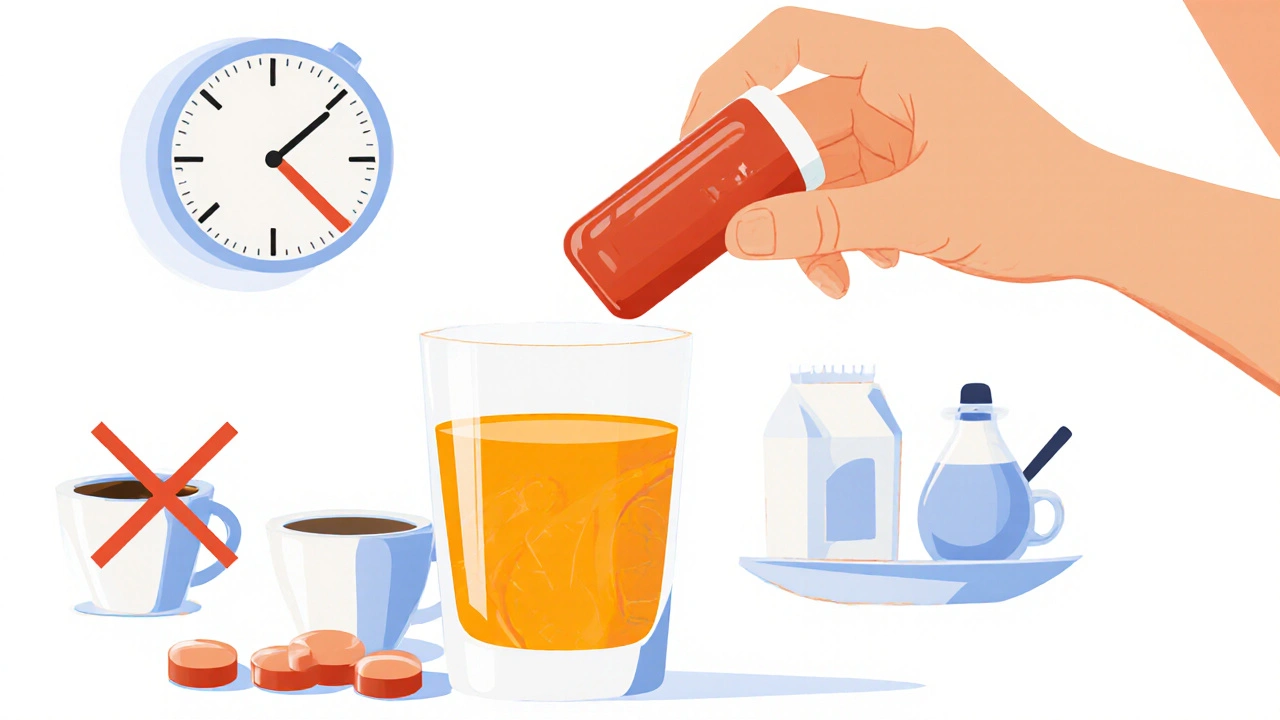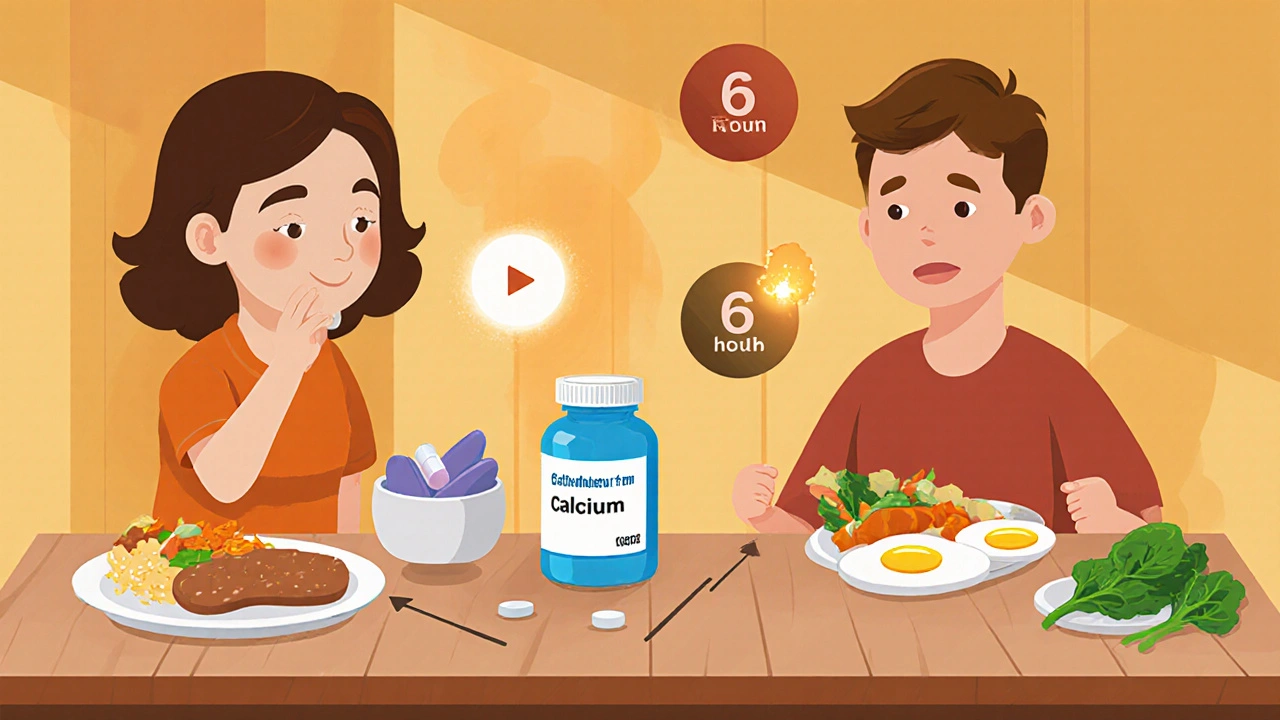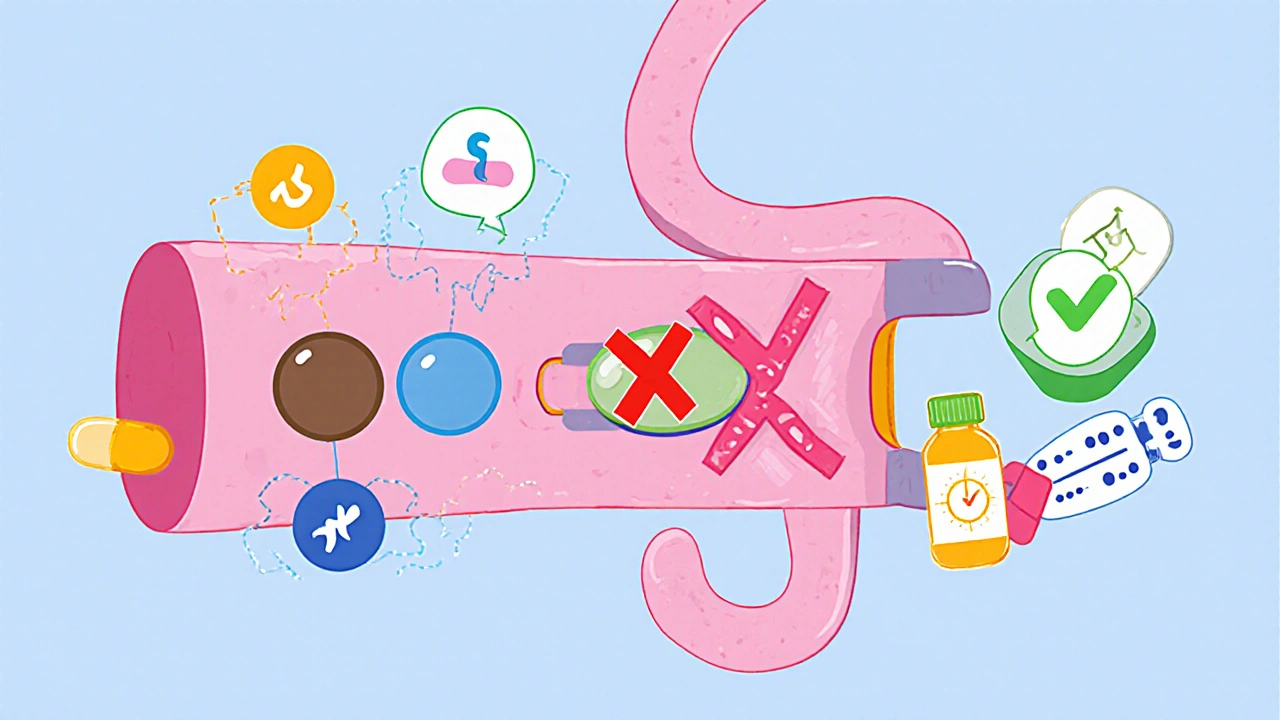Calcium and Iron Supplements with Medications: How to Avoid Absorption Problems
 Oct, 30 2025
Oct, 30 2025
Calcium & Iron Timing Calculator
How to use this calculator:
Choose your supplement (calcium or iron) and what you're taking it with (medication or food). We'll tell you the optimal separation time for maximum absorption.
Supplement Type
What you're taking with it
Optimal Separation Time
Recommended Separation Time:
Recommended Daily Schedule:
Important Safety Note:
This tool is for educational purposes only. Always consult with your healthcare provider or pharmacist before changing your supplement or medication schedule.
Take your iron pill with breakfast. Take your calcium pill with dinner. Sounds simple, right? But if you’re on antibiotics, thyroid meds, or even heartburn medicine, that routine could be making your supplements useless-or worse, putting your health at risk.
Why Calcium and Iron Don’t Play Nice with Medications
Calcium and iron are both positively charged minerals. That might sound harmless, but inside your gut, they act like magnets for certain drugs. When they meet antibiotics like ciprofloxacin or tetracycline, they bind together tightly. This binding stops the medicine from being absorbed. The result? You’re not getting the full dose, and your infection might not clear up. The same thing happens with levothyroxine, the common thyroid hormone replacement. Calcium and iron can block its absorption, leading to low thyroid levels even if you’re taking your pill every day. And if you’re on bisphosphonates for osteoporosis? Those won’t work either if you’ve taken calcium too close by. Even common heartburn meds like Tums (calcium carbonate), Pepcid, or Prilosec make things worse. They reduce stomach acid, which is needed to dissolve iron so your body can absorb it. Without enough acid, your iron pill might as well be a rock.Calcium and Iron Compete With Each Other
Here’s the twist: calcium doesn’t just interfere with your meds-it also fights with iron for the same absorption pathway in your intestines. Both use the same transporters to get into your bloodstream. When you take them together, they literally crowd each other out. A 1991 study from the American Journal of Clinical Nutrition found that taking 600 mg of calcium with 18 mg of iron reduced iron absorption by up to 62%. That’s more than half your iron gone. And it didn’t matter if the calcium came from a supplement or a glass of milk. The effect was the same. Even more concerning: women who take calcium supplements with meals regularly struggle to meet their daily iron needs. The study followed 61 healthy women and found that calcium taken with food made it nearly impossible to absorb enough iron from diet alone. That’s a big deal-especially since women need 18 mg of iron daily just to replace what’s lost during menstruation.When to Take Iron (and When Not To)
The best time to take iron? On an empty stomach. That means at least one hour before or two hours after eating. Why? Because food, especially dairy, coffee, tea, and whole grains, contains compounds that block iron absorption. Taking iron alone gives it the best shot. But here’s the catch: 30 to 50% of people get stomach cramps, nausea, or diarrhea when they take iron on an empty stomach. That’s why many people give up and take it with food-even though it cuts absorption by up to 70%. There’s a smarter way. Take your iron with vitamin C. A glass of orange juice or a 200 mg vitamin C tablet can boost iron absorption by up to 300%. It turns non-heme iron (the kind in supplements and plants) into a form your body can grab onto easily. So instead of swallowing your iron pill with your morning coffee, try this: wake up, drink a glass of orange juice, take your iron pill 30 minutes later. Wait two hours before eating anything else. That’s your sweet spot.
When to Take Calcium
Calcium is the opposite. It absorbs best with food. That’s because your body needs acid to break it down, and eating triggers stomach acid production. Calcium citrate is an exception-it can be taken with or without food-but most calcium supplements are carbonate, which needs food to work. So if you’re taking both calcium and iron, don’t try to do both at once. Split them up. Take iron in the morning on an empty stomach with vitamin C. Take calcium at dinner with your meal. That gives you at least a 6-hour gap. Better yet, take calcium at bedtime. Your body absorbs it more efficiently at night.Medications That Absolutely Can’t Mix
Here’s a quick list of drugs that get blocked by calcium or iron-and how to avoid the problem:- Tetracycline antibiotics (doxycycline, minocycline): Take at least 2 hours before or 4 hours after iron or calcium.
- Fluoroquinolones (ciprofloxacin, levofloxacin): Same rule-2 to 4 hours apart.
- Levothyroxine (for hypothyroidism): Take on empty stomach, wait 4 hours before taking calcium or iron.
- Bisphosphonates (alendronate for osteoporosis): Take first thing in the morning with plain water, wait 30 minutes before eating or taking any supplement.
- Proton pump inhibitors (omeprazole, pantoprazole): Long-term use can cause iron deficiency. If you’re on these, talk to your doctor about checking your iron levels.
What About Food?
It’s not just supplements. Your meals matter too. A breakfast of oatmeal with milk and a banana might seem healthy, but it’s a nightmare for iron absorption. Oats have phytates. Milk has calcium. Bananas have polyphenols. All three block iron. On the flip side, a breakfast of scrambled eggs with spinach and orange juice? That’s iron-friendly. Eggs have heme iron (easier to absorb), spinach has non-heme iron, and the orange juice boosts it. Just avoid the milk. The same goes for tea and coffee. Tannins in both can cut iron absorption by up to 60%. If you’re low in iron, drink your coffee after lunch-not with breakfast.
What to Do If You’re Already Taking Them Together
If you’ve been taking your iron with your calcium pill-or with your antibiotic-and you’re not feeling better, it might not be your dose. It might be your timing. Start tracking. Write down what you take, when, and with what. Then adjust. Try moving your iron to the morning, calcium to the evening. Separate antibiotics by at least two hours. Use a pill organizer with time slots. And if you’re still tired, dizzy, or getting frequent infections? Ask your doctor for a blood test. Check your ferritin (iron stores), hemoglobin, and thyroid levels. You might be taking the right pills-but not at the right time.Special Risks and Safety Tips
Iron poisoning is the leading cause of fatal childhood poisonings in the U.S. Keep all iron pills out of reach of kids. Even one tablet can be deadly for a toddler. Black stools? Normal when you’re on iron. But if your stool is tarry, bloody, or you feel dizzy, get checked immediately. That could mean internal bleeding. Liquid iron can stain teeth. Use a straw. Rinse your mouth after. If stains happen, baking soda paste or diluted hydrogen peroxide can help-but don’t scrub hard. Your enamel is fragile. And if you’re pregnant? Iron needs jump to 27 mg daily. Calcium needs stay at 1,000 mg. But don’t take them together. Split them. Talk to your OB-GYN about the best timing. Your baby needs both.Bottom Line: Timing Is Everything
Calcium and iron aren’t bad. They’re essential. But they’re not meant to be taken with every pill in your medicine cabinet. Iron works best on an empty stomach with vitamin C, away from calcium, dairy, coffee, and antibiotics. Calcium works best with food, especially at night, and away from thyroid meds and bisphosphonates. The fix isn’t about stopping supplements. It’s about spacing them out. Two hours. Four hours. Sometimes six. That’s all it takes to make your meds work-and your body actually absorb what you’re giving it. If you’re unsure, ask your pharmacist. They see these interactions every day. Don’t guess. Don’t assume. Get the timing right-and your body will thank you.Can I take calcium and iron together if I space them by 2 hours?
No. Even 2 hours apart isn’t enough for optimal absorption. Calcium and iron compete directly in the gut, and their absorption pathways overlap. The best practice is to take them at least 4 to 6 hours apart-ideally, iron in the morning on an empty stomach and calcium at night with food.
Does vitamin C really help iron absorption?
Yes. Vitamin C increases non-heme iron absorption by up to 300%. It converts iron into a more soluble form your gut can absorb. Taking your iron pill with a glass of orange juice, a vitamin C tablet, or even a few strawberries makes a measurable difference. Don’t skip this step if you’re trying to raise your iron levels.
Why do some iron supplements cause black stools?
Black, tarry stools are normal when taking iron supplements because unabsorbed iron passes through your digestive tract and reacts with sulfur compounds in the gut. This is harmless. But if your stool is shiny, sticky, and smells foul-or if you see red streaks-it could indicate bleeding. Contact your doctor immediately in that case.
Can antacids like Tums cause iron deficiency?
Yes. Antacids containing calcium carbonate, magnesium, or aluminum reduce stomach acid, which is necessary to dissolve iron so your body can absorb it. Long-term use of these medications-especially proton pump inhibitors like omeprazole-is linked to iron deficiency, especially in women and older adults. If you’re on these drugs long-term, ask your doctor to check your iron levels.
Should I stop taking calcium if I’m low in iron?
No. Calcium is vital for bones, nerves, and muscles. Don’t stop taking it. Instead, change when you take it. Take iron in the morning on an empty stomach with vitamin C. Take calcium at night with dinner. This simple shift can fix absorption issues without sacrificing either nutrient.
How long should I wait after taking iron before eating?
Wait at least one hour after taking iron before eating. Food, especially dairy, tea, coffee, and whole grains, blocks iron absorption. If you can’t tolerate an empty stomach, take iron with a small amount of vitamin C-rich food like a few orange slices-but avoid anything high in calcium or fiber. Two hours is ideal for maximum absorption.
Are liquid iron supplements better than pills?
Liquid iron can be easier to swallow and sometimes better absorbed, especially for people with stomach issues. But they often contain more sugar and can stain teeth. Use a straw, rinse your mouth afterward, and brush gently with baking soda if stains occur. Pills are more convenient and easier to time correctly with medications.
Can I take iron with my multivitamin?
Most multivitamins contain calcium, zinc, or magnesium-all of which interfere with iron absorption. If you need extra iron, don’t rely on a multivitamin. Take a standalone iron supplement with vitamin C, and take your multivitamin at a different time of day, preferably at night.

Vivek Mishra
October 30, 2025 AT 13:30Iron with orange juice? Cute. Try taking it with a shot of espresso instead-your body absorbs it better when you’re already in fight-or-flight mode. Also, calcium at night? My grandma took hers at 3 a.m. with a glass of whiskey. She lived to 98. Just saying.
thilagavathi raj
October 31, 2025 AT 02:30THIS IS A MEDICAL EMERGENCY. YOU’RE NOT JUST ‘SPLITTING TIMING’-YOU’RE PLAYING RUSSIAN ROULETTE WITH YOUR THYROID, YOUR BONES, AND YOUR OXYGEN SATURATION. I’VE SEEN WOMEN TURN INTO ZOMBIES BECAUSE THEY TOOK CALCIUM WITH THEIR LEVOTHYROXINE. DON’T BE THAT PERSON.
Sandridge Neal
October 31, 2025 AT 10:06Thank you for this incredibly well-researched and clinically sound breakdown. This is exactly the kind of clear, actionable guidance that empowers patients to take ownership of their health. I’ve shared this with my entire wellness group-every member now has a personalized supplement schedule. Knowledge is power, and you’ve just handed out the keys.
Diane Thompson
November 1, 2025 AT 19:19Wow. So much text. I just take my pills with water and hope for the best. Also, who has time to wait two hours after taking iron? I’m a mom. I eat when the kids let me.
Helen Moravszky
November 2, 2025 AT 12:07OMG YES I’VE BEEN DOING THIS WRONG FOR YEARS 😭 I just started taking iron in the morning with orange juice and calcium at night and I already feel less tired! Thank you thank you thank you!! Also I think i spelled levothyroxine wrong but you get the point 💪
Reginald Matthews
November 4, 2025 AT 07:22Interesting. I’ve been taking iron with food because it upset my stomach, but I never realized how much I was losing. Do you know if the 300% boost from vitamin C applies to all forms of non-heme iron, or just supplements? Also, what about citrus peels-do they have more vitamin C than the juice?
Debra Callaghan
November 4, 2025 AT 18:05If you’re still taking calcium and iron together after reading this, you’re not just ignorant-you’re dangerous. People die from untreated hypothyroidism. Stop being lazy. Your body isn’t a suggestion box.
Mitch Baumann
November 6, 2025 AT 13:18…and yet… 🤔…one must consider the circadian rhythm of gastric emptying… 🧠…and the pH-dependent solubility of ferric ions… 🧪…not to mention the enterohepatic recirculation of bile acids… 🌙…which may modulate calcium transporter expression… 📈…thus, while the 6-hour separation is statistically optimal… 📊…one might argue for a 7.2-hour window… 🕒…especially if one is biohacking… 🧬…and using a wearable to track serum ferritin in real-time… 📲…just saying… 💎